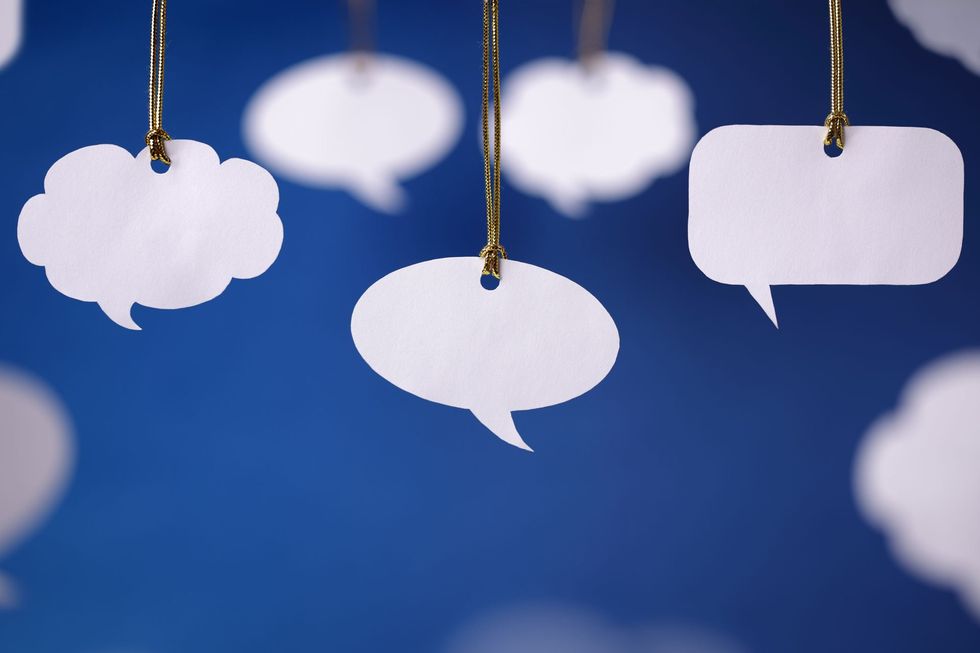It’s one thing to be able to talk to people. It’s another thing to be a good conversationalist .
However, as you probably know, this isn’t as easy of a skill as it seems. That’s because there’s so much more to making good conversation that just being able to talk and respond well.
Writer and radio host, Celeste Headlee, shares 10 ways to have a better conversation in her TED talk below.
Here are some key takeaways from her incredible presentation.
Don't Multitask
In other words, truly give the person you’re speaking with your undivided attention. Yes, that means you’ll have to tear yourself away from your smartphone or your computer (in a work situation).
However, Celeste takes it one step further by challenging you to be present. Outside of the physical things you’ll need to part from to pay attention, you’ll also need to part mentally from whatever thoughts that will distract you from the person you’re speaking with. So, don’t think about your next meal, an upcoming bill, or most commonly, your next response.
Celeste says to let your thoughts flow through. Therefore, don’t get fixated on external or internal factors and hear that person out in entirety.
Let Them Finish
If you’re like me, you may have a tendency to interject when things move you (...or aren’t correct.) However, to show the person that you’re talking to true respect, you have to let them speak in entirety. Without doing so, you risk missing important details from what they’re saying, or worse, come to an assumption about something that isn’t true. Just think about how you feel when someone cuts you off when you’re in the middle of explaining something.
Be respectful — let them finish.
Don't Relate
By this, I mean, don’t tell a story about yourself every time a person tells you something about themselves (especially if it’s sad or angering.) As Celeste says, it's never the same and it's never about you . Most likely, people are just looking for someone to vent to about what’s going on in their life. Also, trying to relate could even be interpreted as you trying to compete with their situation.
Instead, take this time to better understand their situation, similarly to an approach of a therapist; ask how that situation was or how it made them feel.
Listen
This is truly the most important tip from the entire TED talk.
We hear this tip over and over again, but we often get it wrong or just don’t put enough effort into doing it. This is because:
- Listening is so much more than hearing someone.
If you are actively listening to someone, you’ll be able to pick up the key things of what they’ve said, sum up what they’ve said, and make a relevant and valuable response in return. - We like to talk.
By talking, we’re in control of what we want to say and how we can present ourselves. - We don't have the attention span.
You’ve probably heard that the average person’s attention span is less than a goldfish. However, Celeste breaks it down further by explaining that the average person speaks about 225 words per minute, yet the average person can listen up to 500 words per minute. Therefore, our minds try to fill in those extra 275 words, causing us to drift off into them, and shift our attention from the person we’re conversing with.
Celeste addresses these tendencies with strong counters from Buddha:
“If your mouth is opened, you’re not learning”
and Calvin Coolidge:
“No man ever listened his way out of a job.”
Listen to Learn
And this tip is truly the most inspirational.
Celeste addresses the root of our listening problem by quoting Steven Covey, stating that most of us don't listen with the intent to understand; we listen with the intent to reply.
Therefore, challenge yourself to listen with a. Celeste believes that if we approach every conversation with the assumption that we have something to learn from the person we’re speaking with, we’ll be in a better mindset to respond and to create better conversation.
Celeste also believes that everyone is an expert at something and prefaces her belief with a quote from Bill Nye: “Everyone you’ll ever meet knows something you don’t.”
Being a good conversationalist is vital to every aspect of your life. The skill holds value in much more than a work setting or in the media world. It strengthens the relationships you have with your family, friends, and significant other. It can build quick and strong trust with the new people that walk into your life. And it will allow you to walk away from every conversation feeling amazed by what you’ve learned and by the new bond you’ve created with others.

















